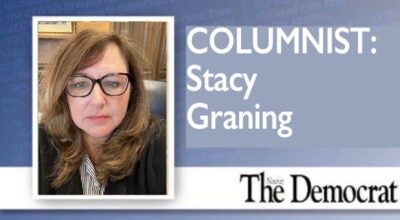King’s assassination changed my life
Published 12:06 am Thursday, April 6, 2017
Good morning, Democrat reader.
Just the other day on Facebook someone posted a question, “Has anything ever happened in your life that was a turning point?”
Absolutely, yes. I have told it to people over the years, but I have never written about it. I’m going to be as succinct as possible without losing the pertinence, but I am imploring you to stay with me. Go get you some more coffee. Or something.
Monday, I finished reading “Mississippi Blood,” by our own Greg Iles.
Tuesday marked the 49th anniversary of the assassination of Martin Luther King Jr.
That Facebook post, finishing the book, and the anniversary of Martin Luther King, Jr.’s assassination, all falling so close together inspires me to tell this story.
On April 4, 1968 — 49 years ago — I was 24 years old, living in Greenville with my husband and a 2-year-old son appearing daily on WABG-TV as the Romper Room teacher, and pretty much avoiding the civil rights activity and Vietnam protests going on around me.
April 4 was a Thursday that year. It was the middle of Lent, which coincided with covered-dish dinners at St. James Episcopal Church, and I was in attendance that evening.
Also present in the parish hall that evening sitting at the same table seven or so seats away were some nationally-known liberal Democrats. One was Hodding Carter Jr., editor of the Delta Democrat Times and a victim of a few Ku Klux Klan cross burnings, and later to be President Jimmy Carter’s Under Secretary of State Wes Watkins, a White House aide to LBJ, their spouses and a few friends. I found myself in awe of them, although they were aliens to all the attitudes and racial prejudices that defined my upbringing.
Halfway through dinner, someone burst into the room, approached the table and whispered something into Hodding’s ear. After a slight bit of mumbling and what appeared to be spontaneous decision making, the entire entourage rose and exited the facility.
Word trickled down the table that MLK had been killed. I and the several people around me seemed to show little or no concern. And I am thinking, though it hurts me horribly to say this today, “So what?”
Very shortly, my focus turned to the liberals who’d been at the other end of the table, who initially appeared shocked and horrified, but displayed, by my account, a duty to “do something.”
And so it was a turning point. I began thinking, listening, associating with free thinkers. Questioning what I’d always been told.
Though totally out of place and wildly uncomfortable around intellectuals, which seemed to be a common trait among most liberals, I was eventually able to discern who was genuinely aboard the civil rights movement, as in taking a stand on justice, and found myself quite comfortable voicing my position on respect for human dignity and racial equality.
Among those I’d grown up with and those whose names I’ll never know, but who held tightly to the white supremacy mindset, a genuine friendship was no longer on the table.
In the fullness of time, I have ended up in my hometown of Natchez. In the 32 years away, I experienced three marriages, that same number of divorces and careers and lived in nine states.
During my time away, and to this moment, I can tell you that my life’s work has been on two things: racial harmony, and the uncovering of what the hell happens between two people who once could not keep their hands off each other who one day cannot smile at each other over a simple dinner salad.
Bringing it home now, and thank you for listening, the first thing I did in 1996 when I returned to Natchez after getting a library card and registering to vote was to go see my old friend Butch Brown, who was mayor at the time. I wanted him to know I wanted to do something, whatever it might be, to promote racial harmony.
“Well, you are in the right place. Our chamber of commerce has a unification committee designed for that very purpose. The chamber is one block up and you can cut through that lot across the street right there,” he said pointing out his window, “Where the old Baker Grand was. It’s in the old Institute building. Jump in!”
I did exactly that. In the early years, the committee, equally balanced in race, did some hard work. We had to come clean with our very own resentments, superiority, and fixed biases. In that effort, sometimes amidst tears and laughter, we had social activities together that included the ground breaking pot luck dinners in each other’s homes.
We disbanned a few years later once we agreed we had at least accomplished harmony amongst ourselves and acknowledged that there’d always be about 15 percent black and 15 percent white who will hate and never be interested in a racially happy coexistence. The remaining 70 percent, we unanimously agreed made up a noticeable number of Natchezians who are wide open to accepting our differences and valuing our common love of this old, unique, party-loving, historical, charming river city.
Forty-nine years later, April 4, in Lent, age 73, “free at last” without any axes to grind or opinions to ponder, I pay tribute and hold undying gratitude and respect to Hodding Carter and company whose actions led me out of ignorance, and Greg Iles for exposing the evils of racial hatred. And thank you, Larry Bass, for posing that question on Facebook yesterday.
Jack Kelly is a Natchez resident.





